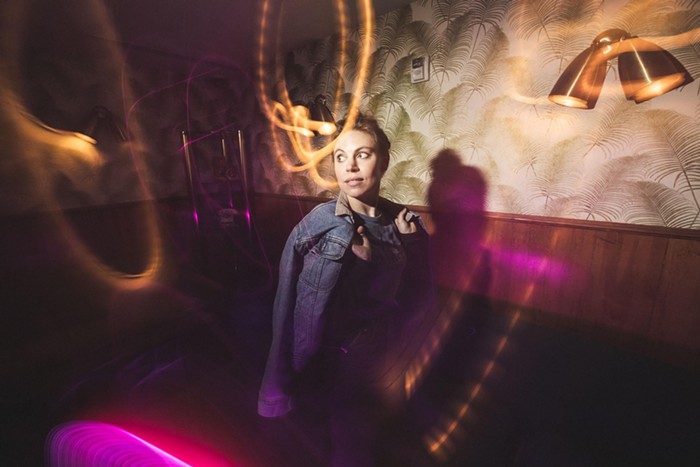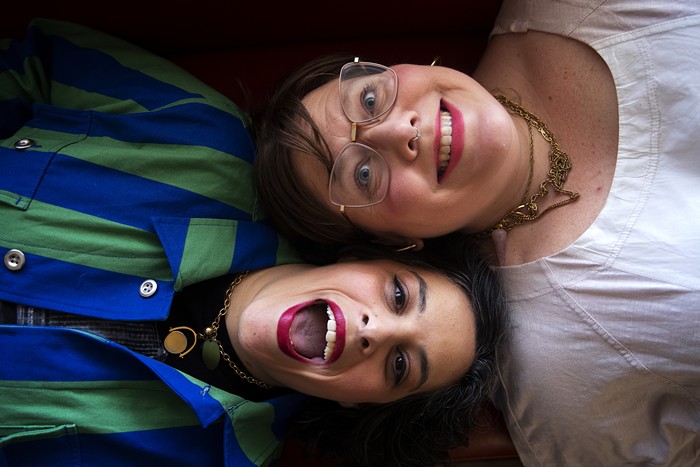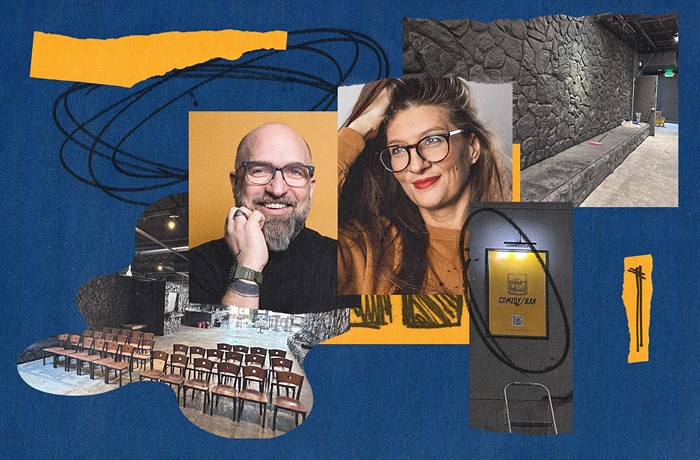A masterly storyteller with an expressive face and a voice adept at many impressions, Portland-raised stand-up and actor Matt Braunger is an expert at finding absurdity in mundane situations. Braunger seems like a nice, relatable person, which can be a drawback for a stand-up, but he succeeds through the nuts and bolts of timing, delivery, exceptional descriptive powers, and an unerring knack for extracting the funniest details from random encounters.
Sure, the 48-year-old explores familiar topics like romantic relationships, the male ego, drinking problems, and drug trips gone awry. But some of his best bits have also tackled the authoritarian nature of nine-year-old girls, the Gin Blossoms’ ultimate white-privilege lyrics, locker-room etiquette, bathroom-door knocks, butt surgery, and the unfuckingbelievable hubris of Billy Joel’s “Piano Man.”
Braunger’s television credits include performances on sketch shows like MADtv, he’s built a solid discography of comedy albums, and he’s showed up alongside almost every late-night show you could think of, from Conan to John Oliver’s New York Stand-Up Show. I caught up with Braunger by email before his two-night four-set run at Here-After on August 12-13.
THE STRANGER: How did Portland shape your comedic sensibility?
MATT BRAUNGER: I was lucky to grow up in Portland while it was still “weird” (i.e., bizarre art everywhere, real “characters” living there, an appreciation for all things alternative and non-mainstream), but had almost no hype or attention. To us, Seattle was the “cool” city in the PNW. I would randomly think, “I bet something cool is going on right now in Seattle” as a kid. Haha.
Has Portlandia done more harm than good to the city’s reputation?
You’d have to ask a local, as I haven’t lived there as a resident for so long. I moderated the Portlandia Q&A with Fred [Armisen] and Carrie [Brownstein] at SXSW one year, and that was a blast, but part of me wanted to go,“You guys aren’t even from there!!” But I love Fred and Carrie. I saw a T-shirt for a Portland band that had Ramblin’ Rod (who was like the Bozo the Clown of PDX) holding both their decapitated heads and grinning, which made me LOL. Overall, I don’t think the show hurt Portland. I thought the show was hilarious and the parodies were dead on.
What is the most important catalyst for your humor?
Just a funny memory or thought, that’s it. If it makes me laugh, I try it onstage. Sometimes it falls flat, and then I see if I want to try it again and again to get it to where it worked in my head.
What topics will you never address in your act, and why? Or, to play devil's advocate, are taboo subjects for the spineless?
I don’t do a lot of political stuff because I’m not great at it (I end up getting too mad), but I don’t think anything is off limits. You can say anything, you just have to make it funny. Here’s the rub: Not everybody can pull off a [blank] joke. It’s comedy. Funny is paramount. Are you trying to be funny or are you trying to be different/edgy? Usually the guys who bitch about “everybody’s too offended these days” are the most offended at stuff.
What’s a richer source of humor—mundanity or profundity?
I think the argument could be easily made for both. Profundity is what, Doc Ellis pitching a no-hitter on acid? Amazing and hilarious, but what is profundity, everyday life? Everyday life is just as horrifying and exhilarating, with the same level of stakes. You’re just not on a pitcher’s mound on national television.
What’s your take on bodily function jokes? Lowest form of humor or universal bonding agent? Both? Are there fresh angles to be explored with them or should we flush them down the toilet forever?
Bodily function jokes, to me, will always have a place in comedy. A hard fart in a quiet room full of people is gold. Google “Farting preacher” right now, and enjoy.
Do you notice any difference in audiences from blue states versus red states? If so, what are they? Do you craft your sets differently for each? I'm thinking specifically about how your white privilege bits go down in red states, assuming you're still doing them.
I don’t really change anything from place to place, and sometimes I get some crossed arms in the audience, but not much worse than that. Most people who go to comedy shows actually enjoy different viewpoints. I mean, that white privilege bit is about the Gin Blossoms guy singing “Tomorrow we can drive around this town, and LET THE COPS CHASE US AROUND.” Even the most “All Lives Matter” dingbat has to admit no Black person could ever sing that.
Do you find it harder to create quality material now that you’re married and have a child than when you were single and on the prowl?
Haha, not really. Maybe I was less precious with my material when I was a carousing every night, but back then I yelled a lot more, too. Man, did I yell. I think I was just lonely?
You’ve done some sets on big late-night TV shows. What, if anything, can you reveal about those gigs that most people outside of comedy don’t know?
I was the last guest of 2008 on The Late Show With David Letterman. I’m waiting to do my set, super nervous, and the booker says “Dave might have you over to the couch; do you have a funny story to tell him?” I rack my brain, come up with one. He laughs and says, “Okay, great, but do you have a backup?” What?!?! No, man! I’m trying to remember my TV jokes!
David introduces me, I have a great set, and Dave calls me over. I tell my “Eggly Bagelface” story from growing up in Portland, and he loves it. He says goodnight, we wave, the cameras cut, and place goes dark and silent. A voice says “Everybody hold! David is leaving.” He stands, walks behind me, and extends a big hand. “You were very funny.” “Thank you.” He walks up some stairs and through a door that then shuts behind him. “All clear!” The lights come up. A producer runs over and says “Great job!” I’m escorted to a side door and walk into an empty, freezing alley covered in ice. The door slams behind me, and I’m cold and alone. THAT’S showbiz!
Who’s your favorite comedian of all time? Who’s your favorite comedian working now? I need reasons, too.
If I have to pick one, it’s Richard Pryor because he was the most nakedly human, which paved the way for all great modern stand-up comedy. Right now it’s a tie between Dave Attell and Dina Martina, because they both make me cry every time I see them.
What’s the one widespread cliché about comics that rings truest to you?
That we’re needy. As Dana Gould puts it, “You have to wonder about people who make a living by begging strangers for love.”
Have you ever been heckled? If so, how did you deal with it?
Negative heckling is really rare. The most common thing is people thinking if they yell stuff out it’s helping, but they’re just being destructive. Kind of like the villagers in Midsommar? I just good-naturedly talk them down or make fun of them in a fun way. I’m not the guy in videos “destroying” them.
What can Seattle audiences expect at your Here-After sets?
It’s a new hour of stories, weird thoughts, and confessions that are funny. My main thing is just not to waste anybody’s time. If I’m paying to see somebody, it better be fun. I’m fun.
What's on your agenda for the near future?
Making that day care money, baby! Oh, and promoting my new special, Doug, that comes out later this year. In a nutshell it's an absolutely silly/deeply personal special about a happily married new “older” father, culminating in the story of the time I met the worst guy ever, named “Doug” and how I'm determined to never be like him.
I had an hour all ready to go right before the COVID lockdown, and a year later when I finally shot the special, I realized I’d thrown away at least half of it in exchange for what I got from a year of not doing comedy. Irony!


















